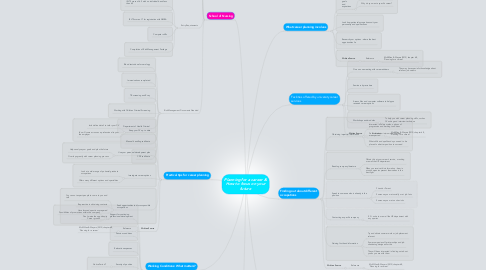
1. Working Conditions: What matters?
1.1. Support for continuing professional development
1.1.1. Possibilities of promotions within the company
1.1.2. Career growth
1.2. Pension conditions
1.3. Relocation expenses
1.4. Security of position
1.4.1. Notice Period?
1.5. Long term prospects
1.6. Perks such as share ownership, company car or private medical care
1.6.1. Company benefits in salary package
1.7. Career progression
1.8. Written Source
1.8.1. Reference
1.8.1.1. McMillian & Weyers (2012) chapter 68, 'Planning for a career'
2. Create an action plan
2.1. What sort of degree will you need to bring your ambition?
2.1.1. Future model choices
2.1.1.1. Skills and knowledge you gain
2.1.1.2. well matched to your career aspirations
2.1.2. The precise type of degree
2.1.2.1. Honours or Masters degree
2.1.2.2. Perhaps could influence your chances in the career
2.1.3. The nature of project work
2.1.3.1. Job placements you choose
2.1.4. How hard you work to obtain the degree classification
2.1.4.1. You may need a minimum qualification
2.2. Written Source
2.2.1. Reference
2.2.1.1. McMillian & Weyers (2012) chapter 68, 'Planning for a career'
3. Practical tips for career planning
3.1. Keep your CV up to date
3.1.1. Include fine detail to tailor your CV
3.1.2. You will come across as a professional to your the employer
3.2. Use your personal development plan
3.2.1. Helps analyse your goals and plan the future
3.2.2. Over laps greatly with career planning process
3.3. Investigate career options
3.3.1. Look at a wide range of potiental graduate occupations
3.3.2. Offers many different options and specialities
3.4. Seek opportunities to discuss possible occupations
3.4.1. You can not expect people to come to you and talk
3.4.2. Be proactive in obtaining contacts
3.4.3. Have focused questions prepared
3.4.4. Don't waste the opportunity
3.5. Written Source
3.5.1. Reference
3.5.1.1. McMillian & Weyers (2012) chapter 68, 'Planning for a career'
4. School of Nursing
4.1. About the nursing program at ECU
4.1.1. Largest program in WA
4.1.2. Forerunner in health care simulation and scenario based learning across health disciplines
4.1.3. The well qualified staff and world class facilities position us as the premium provider of nursing qualifications in WA
4.2. Clinical placements Rural and Metro
4.2.1. The state has nine vast and varying non-metropolitan regions.
4.2.2. Offers a unique lifestyle, climate and nurse employment opportunities
4.3. International Placement
4.3.1. Offers students the opportunity to undertake a community placement overseas
4.3.2. Current opportunities include, Thailand, Laos, Cambodia, India Tanzania and Manila
4.4. Entry Requirements
4.4.1. IELTS score of 6.5 with no individual band less than 6.5
4.4.2. IELTS score of 7 for registration with NMBA
4.4.3. Computer skills
4.4.4. Completion of Risk Management Package
4.5. Risk Management Documents Needed
4.5.1. Blood tests done for serology
4.5.2. Immunisations completed
4.5.3. TB screening and X-ray
4.5.4. Working with Children Criminal Screening
4.5.5. Department of Health Criminal
4.5.6. Manual handling certificate
4.5.7. CPR certificate
5. What career planning involves
5.1. Clear thinking about goals and aspirations
5.1.1. What you want to do in the future?
5.1.2. Why do you want a specific career?
5.2. Look how potiental occupations suit your personality and qualifactions
5.3. Research your options - where the best opportunities lie
5.4. Written Source
5.4.1. Reference
5.4.1.1. McMillian & Weyers (2012) chapter 68, 'Planning for a career'
6. Facilities offered by university career services
6.1. One on one meeting with career advisers
6.1.1. They may have specialist knowledge about relevant job sectors
6.2. Seminars by recruiters
6.3. Access files and computer software to help you research career options
6.4. Workshops and modules
6.4.1. To help you with career planning skills, such as CV writing and interview technique
6.5. Written Source
6.5.1. Reference
6.5.1.1. McMillian & Weyers (2012) chapter 68, 'Planning for a career'
7. Finding out about different occupations
7.1. Obtaining impartial information
7.1.1. Interested in Salary scales, options of progression and working conditions
7.1.2. Find out what minimum qualifications are expected
7.1.3. What skills and qualities do you need to be placed in a better position to succeed
7.2. Reading company literature
7.2.1. Obtain this at your career's service, or writing or email the HR department
7.2.2. When you receive this information - bear in mind companies present themselves in the best light
7.3. Speak to someone who is already in the position
7.3.1. Friend or Parent
7.3.2. Someone you met socially or at job fairs
7.3.3. Someone you met on site visits
7.4. Contacting a specific company
7.4.1. E.G. write to or email the HR department with any queries
7.5. Gaining first hand information
7.5.1. Try and obtain summer work or job placement relevant
7.5.2. Some companies offer internships and job shadowing designed for this
7.5.3. They will be as interested in finding out about you as you are with them
7.6. Written Source
7.6.1. Reference
7.6.1.1. McMillian & Weyers (2012) chapter 68, 'Planning for a career'
8. What skills and personal qualities will be relevant?
8.1. Employers interested in personal qualities
8.1.1. Show that you have the skills and qualities they want
8.2. Personal references
8.2.1. This is a support document of experience and personal qualities
8.3. Extra-curricular activities
8.3.1. Provide such evidence about your personal qualities by showing them extra-curricular activities
8.4. Written Source
8.4.1. Reference
8.4.1.1. McMillian & Weyers (2012) chapter 68, 'Planning for a career'
